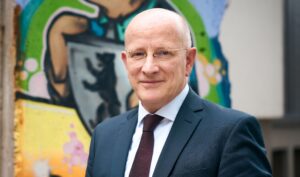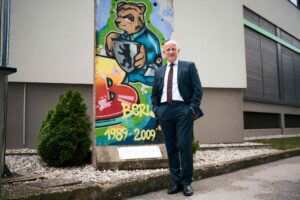Germany appreciates Croatia as a partner with a European outlook that contributes to making our “home Europe” a better place and shares our understanding of the rules of the game.
For our two countries, I hope for an even stronger political partnership and for deeper economic cooperation. For the EU as a whole, I am confident that it will be an even stronger player on the global stage, its members acting efficiently and intelligently with one voice on the basis of shared values such as democracy, rule of law and human dignity. And in ten years time we will be more than 27 Member States. And Ukraine will prevail. As to Russia, I can only hope that it will undergo change and become a constructive member of the international community, for Diplomacy&Commerce says H.E. Christian Hellbach, Ambassador of the Federal Republic of Germany in the Republic to Croatia.

- It seems that Croatia and Germany do not have any issues and that the relations between the two countries are allied in every sense. How do you evaluate these relationships and is there any point on which additional work could be done?
It is true that relations between Germany and Croatia are friendly and partnership. This does not mean, however, that there is no room for improvement; we should not lay back and be content with what we have but instead strive constantly to renew and deepen our bilateral cooperation in areas of common interest, also responding to new circumstances and challenges.
One of my favourite topics is energy transition because countering climate change is one of our most important foreign policy objectives and because I see Croatia as part of the emerging common European market for energy from renewable sources. Experts tell us that Croatia’s potential for producing energy from renewable sources is at least 7 to 8 times higher than its own needs, even after full decarbonisation. This means, in short, that Croatia could become a net energy exporter. Energy exports could boost growth and development in Croatia and help satisfying, at the same time, our demand for green energies.
Another important issue is the future of the European Union. In an ever more complex global context we cannot afford to keep doing business as usual. The EU must become more efficient in its decision-making, more sovereign in its dealings with the world. Hand in hand with this goes the enlargement of the EU, especially here in Croatia’s immediate neighbourhood. Both our countries strongly support enlargement. We are allies on this issue. My sense is, however, that we could cooperate even more closely also on this subject. Also, we strongly believe that the EU and its institutions need to change in order to be capable of absorbing a relatively large number of new members. Already now, at 27, we face operational issues and enlargement is supposed to make the EU stronger, not just bigger.
Let me mention another very practical issue I have come across in discussions with our partners, particularly at the local and regional levels, namely waste management. This is not an easy task, but many German municipalities and companies have tackled it in the past and managed to solve numerous problems. That is why we are working to promote the exchange of know-how and mutual support in this important task for the whole of Croatia.
In German we say “wer rastet, der rostet”, in Spanish “camarón que se duerme, se lo lleva la corriente”. Both proverbs mean, basically, that if you rest you lose. We need to keep going and finding new ways to further strengthen our partnership.
2.You often like to say: “Germany and Croatia nurture close partnership relations full of trust.” Our most important joint task in a difficult geopolitical environment is: to strengthen Europe, defend democracy and international law!” How can unity be strengthened, democracy and international law be defended today in times of crisis, insecurity, and war in the heart of Europe?
The European Union is a unique project in the history of mankind. On a continent divided for centuries by war and conflict, it has secured peace, freedom and prosperity for almost 450 million people. I feel very fortunate to be a citizen of such a Union but I would not take this for granted. But we must work hard to keep it that way and, eventually, make it better, more resilient, more competitive. The EU must be capable to act more quickly and more effectively in defence of our sovereignty; at the same time, we must strengthen the EU’s democratic legitimacy and make sure that the rule of law as well as human rights and fundamental freedoms are respected. This was never as clear as it is now in the face of the Russian aggression against Ukraine. The war in Ukraine, this is in Europe by the way, reminds us also of the importance of safeguarding the rules-based international order.
3.Almost 3 million Germans visit Croatia annually, while officially almost half a million Croats live in Germany. Where do you see the bond of closeness between two peoples and two countries? Culture, economy, history…?
In all these areas and many more. In relations between states, it is often institutions that play the main role – governments, ministries, parliaments, even regions, cities and towns. But it is only when people really communicate, when they get to know each other, that deeper understanding and partnership emerge. And in this respect, our two countries really have a lot to show. But it is much more than that – our economic ties are very strong; Germany has been Croatia’s largest economic partner for decades. Many Croatians have studied or went to school in Germany and there is a growing number of German students in Croatia, particularly medical students. More and more Germans who are either digital nomads or can afford to work from home chose to settle in Croatia.
Also politics connect us, believe it or not; not only are we partners in the EU, we also share certain reflexes when it comes to international relations, for instance in the case of the Russian aggression against Ukraine. Also I am told that many Croatians still remember Germany’s support for Croatia in the early 1990s.
I am glad, in any case, that the relations between Germany and Croatia are much more than just formal, official or institutional.

4, 2024 is a “super election year”. From elections in different countries to elections for the European Parliament. There are also American elections, and even in Croatia itself. In which direction do you see the development of events and in which direction is Europe going? To what extent is it possible to threaten the European project itself and the strength of the EU? Where do you see the biggest challenges and how to solve them?
2024 is, indeed, a “super election year”. I can’t really tell you which direction things are taking and even if I knew I guess I should not comment in public. What I can say, however, is that we should all get out to vote when we are called to elections. I have little understanding for those who complain about the alleged lack of democratic legitimacy of our institutions and then abstain from taking part in democratic elections.
This is also true for the upcoming European election. We have to elect our representatives in the European Parliament, in the case of Croatia 12 of them. It is also the European Parliament that represents us, the EU citizens, so it is very important that we all participate in the vote. Turnout in European elections has been relatively low in the past, particularly in Croatia; I hope that we will see an upward trend this time. People should consider that the European Parliament has a say in most of the decisions at the European level that directly affect our daily lives.
In my opinion, the main challenge this time around is to defeat populism, to avoid falling to the temptations of simplistic solutions to complex problems, and to protect democratic values and institutions as well as human dignity.
5. The official position of the government in Berlin is that it supports the enlargement of the EU to the Balkans, but also to Ukraine, Georgia and Moldova. How realistic is it that in the next 10 years the EU will expand and accept new members, and what is crucial on that path for countries that want to be part of a common Europe?
The German government has long been a strong supporter of EU enlargement. Recently, the idea of enlargement has gained momentum also throughout the EU due to the aggression of Russia against Ukraine and various other geopolitical considerations.
The answer to your question about the next ten years lies, however, in the capitals and with the political leaders of the candidate countries because, as we all agree, enlargement must remain a merit-based process. The reasons for this are simple; taking on board countries which do not fulfil all standards would jeopardize the functioning of the Common Market and the European institutions; at the same time, the country in question would probably suffer economically from being fully exposed to a very competitive market.
In addition, there is another important consideration linked to enlargement. How do we make the EU more effective in decision-making, more adaptable to the rapidly changing context of international relations? These are the fundamental questions, and how we answer them will have a profound impact on our ability to act and on our, i. e. European, sovereignty. As mentioned before, already with 27 members we face challenges when it comes to our ability to decide and act quickly. With ten or more new members, the problem can only get worse if we don’t change. That is why we are calling on all to take part in the debate on the future of Europe. There is no single model to follow. The solution will be found in a constructive debate. Participation is key. Everyone’s arguments and positions need to be heard, and I hope that many EU members, including Croatia, will play a more active role in this process.

6. Climate change, energy, gas, green energy – these are global topics that, in addition to everyday ones, occupy the attention of citizens and their governments. Where do you see the role and significance of both Germany and the rest of the EU and Croatia in solving these problems?
Germany is firmly committed to achieving climate neutrality by 2045. At the moment, 54 percent of our electricity comes from renewable sources – mainly wind and solar. It is also worth noting that we have completely phased out Russian gas, oil and coal which was no easy task given the needs of our industry. By 2030, 80 percent of our electricity will come from renewable sources, and by 2035, all of it. The EU as a whole has set itself the ambitious target of becoming carbon neutral by 2050. It will be helped greatly by the fact that renewable energy is cheaper to produce and much easier to use in a “decentralised” way, independent of unpredictable prices on “world markets”, as is the case with fossil fuels.
With our partners in the EU and beyond, we promote energy transition and the fight against climate change also at the international level. Just one example: in 2022, three years earlier than originally promised, we have increased our funding for international climate projects from the federal budget to € 6.4 billion, with additional sources just under €10 billion. This transition must also be about fairness. No country or part of society, including our own, should have to choose between development and climate action. That is why we are working with other EU countries and our global partners to ensure that development goes hand in hand with ambitious climate action.
For Croatia, and I often say this, the green transition could bring not only climate neutrality, but also new opportunities for development, new jobs and income. This is the integration into the already mentioned common European green energy market and the use of the potential of renewable energy, sun, wind and geothermal energy. Statistically, Croatia is in a good position when it comes to clean energy, because a lot of electricity here comes from hydroelectric plants. Much of Croatia’s potential remains unused, however. And, let me be frank here, I sometimes feel that unnecessary burdens are placed on potential investors.